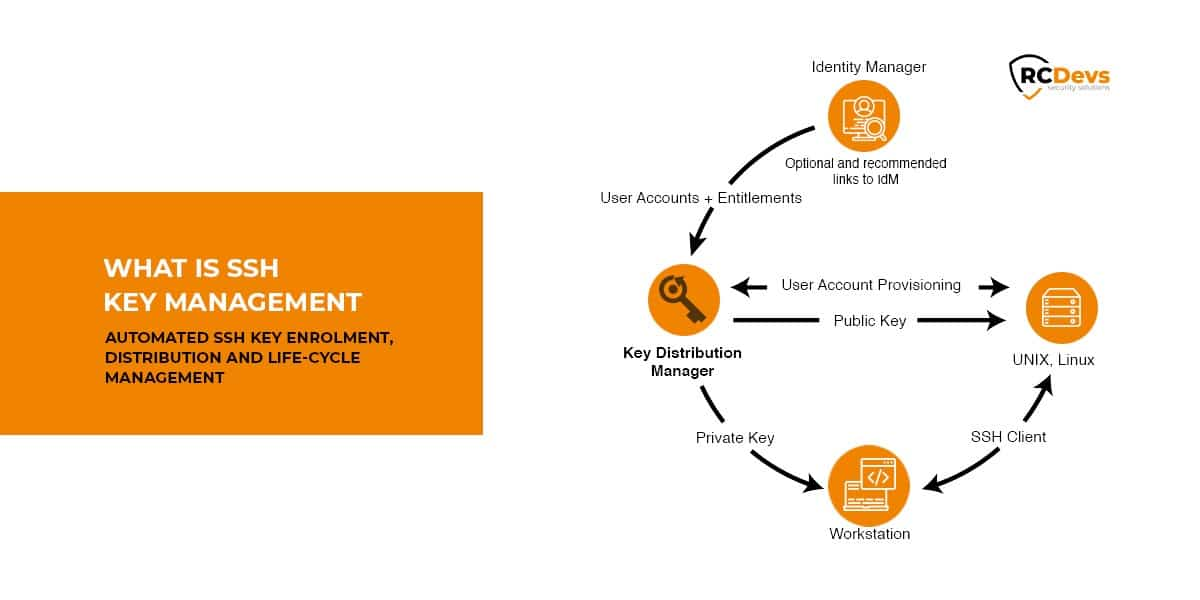RemoteIoT SSH key management is a critical component of secure device communication in the Internet of Things (IoT) ecosystem. As the number of connected devices continues to grow exponentially, ensuring secure access and data integrity has become a top priority for businesses and developers. Proper SSH key management practices are essential to safeguard sensitive information and maintain system integrity.
In today's interconnected world, securing IoT devices through effective key management is no longer optional but a necessity. The rise in cyber threats targeting IoT networks makes it imperative for organizations to adopt robust security measures. RemoteIoT SSH key management provides a reliable solution for securing device communications, protecting against unauthorized access, and ensuring data privacy.
This article will delve into the intricacies of RemoteIoT SSH key management, exploring its importance, best practices, and potential challenges. By the end of this guide, you will have a comprehensive understanding of how to implement secure SSH key management strategies for your IoT infrastructure.
Read also:Exploring The Latest Odia Viral Trends A Deep Dive Into Culture And Creativity
Table of Contents
- Introduction to RemoteIoT SSH Key Management
- Why SSH Key Management Matters in RemoteIoT
- Understanding SSH Keys and Their Role in IoT
- Best Practices for RemoteIoT SSH Key Management
- Common Challenges in SSH Key Management
- Enhancing Security with SSH Key Management
- Tools and Software for Managing SSH Keys
- Automation in SSH Key Management
- Compliance and Regulatory Considerations
- The Future of RemoteIoT SSH Key Management
- Conclusion and Next Steps
Introduction to RemoteIoT SSH Key Management
RemoteIoT SSH key management involves the secure creation, distribution, storage, and revocation of SSH keys used for authenticating devices in an IoT network. SSH (Secure Shell) keys serve as digital credentials that allow secure communication between devices without the need for passwords. In the context of IoT, where devices often operate in remote and unattended environments, SSH keys provide a reliable method for securing data exchanges.
The increasing adoption of IoT devices in various industries, from healthcare to manufacturing, has highlighted the importance of robust security measures. RemoteIoT SSH key management ensures that only authorized devices can access the network, reducing the risk of unauthorized access and data breaches. Proper key management practices are essential to maintaining the integrity and confidentiality of IoT systems.
As the IoT landscape continues to evolve, organizations must stay informed about the latest trends and best practices in SSH key management. This article will explore the fundamental concepts, challenges, and solutions associated with managing SSH keys in RemoteIoT environments.
Why SSH Key Management Matters in RemoteIoT
In the realm of RemoteIoT, SSH key management plays a pivotal role in securing device communications. Unlike traditional IT environments, IoT devices often operate in dispersed locations, making them more vulnerable to cyberattacks. Without proper key management, unauthorized devices could gain access to the network, compromising sensitive data and disrupting operations.
SSH keys offer several advantages over traditional password-based authentication methods. They provide stronger security, eliminate the need for manual password entry, and reduce the risk of brute-force attacks. In addition, SSH keys can be easily revoked or replaced if compromised, ensuring ongoing security for the IoT network.
Organizations that prioritize SSH key management in their RemoteIoT deployments can benefit from improved security, streamlined operations, and reduced maintenance costs. By implementing robust key management practices, businesses can protect their IoT infrastructure from potential threats and ensure seamless device communication.
Read also:How To Download Wasmo Telegram Link 2025 For Free A Complete Guide
Understanding SSH Keys and Their Role in IoT
What Are SSH Keys?
SSH keys are cryptographic keys used for authenticating devices in a secure manner. They consist of a public key and a private key, which work together to establish secure connections between devices. The public key is shared with other devices, while the private key remains confidential and is stored securely on the device.
When a device attempts to connect to an IoT network, it uses its private key to sign a message that is verified by the receiving device using the corresponding public key. This process ensures that only authorized devices can access the network, providing a higher level of security compared to password-based authentication methods.
How SSH Keys Work in IoT
In the context of RemoteIoT, SSH keys are used to secure communications between devices, gateways, and servers. They enable encrypted data exchanges, ensuring that sensitive information remains protected from unauthorized access. SSH keys also facilitate automated processes, such as remote configuration updates and firmware upgrades, without requiring manual intervention.
By leveraging SSH keys, organizations can establish secure and reliable connections between IoT devices, even in environments where physical access to the devices is limited. This capability is particularly valuable in industrial IoT applications, where devices may be deployed in remote locations or harsh conditions.
Best Practices for RemoteIoT SSH Key Management
To ensure secure and efficient SSH key management in RemoteIoT environments, organizations should adopt the following best practices:
- Use strong, unique SSH keys for each device to minimize the risk of key reuse and potential compromise.
- Regularly rotate SSH keys to reduce the window of opportunity for attackers to exploit compromised keys.
- Store private keys securely using hardware security modules (HSMs) or encrypted storage solutions.
- Implement access controls to restrict key usage to authorized personnel and devices.
- Monitor key usage and revoke keys promptly if they are compromised or no longer needed.
By following these best practices, organizations can strengthen their RemoteIoT SSH key management processes and enhance the overall security of their IoT infrastructure.
Common Challenges in SSH Key Management
Key Proliferation
One of the primary challenges in RemoteIoT SSH key management is key proliferation. As the number of IoT devices grows, so does the number of SSH keys required to secure device communications. Managing a large number of keys can become cumbersome, increasing the risk of mismanagement and potential security vulnerabilities.
Key Rotation
Regularly rotating SSH keys is essential to maintaining security, but it can be a complex and time-consuming process. Organizations must carefully plan and execute key rotation strategies to avoid disrupting device communications and ensure seamless transitions.
Key Storage
Storing SSH keys securely is another significant challenge. Private keys must be protected from unauthorized access, while public keys must be easily accessible to authorized devices. Balancing these requirements can be difficult, particularly in large-scale IoT deployments.
Enhancing Security with SSH Key Management
Proper SSH key management is a critical component of securing RemoteIoT environments. By implementing robust key management practices, organizations can protect their IoT infrastructure from a wide range of cyber threats, including:
- Unauthorized access
- Data breaches
- Man-in-the-middle attacks
- Malware infections
In addition to safeguarding sensitive data, effective SSH key management can improve operational efficiency by enabling automated processes and reducing the need for manual interventions. Organizations that prioritize SSH key security can enjoy peace of mind, knowing that their IoT networks are protected against potential threats.
Tools and Software for Managing SSH Keys
OpenSSH
OpenSSH is a widely used open-source software suite for secure network communications. It provides tools for generating, managing, and using SSH keys in IoT environments. OpenSSH is highly customizable and supports a variety of encryption algorithms, making it a popular choice for RemoteIoT deployments.
Key Management Software
Several commercial and open-source key management solutions are available to help organizations streamline their SSH key management processes. These tools offer features such as automated key rotation, centralized key storage, and real-time monitoring, simplifying key management tasks and enhancing security.
Hardware Security Modules (HSMs)
HSMs are specialized hardware devices designed to securely store and manage cryptographic keys. They provide an additional layer of security for SSH keys, protecting them from unauthorized access and tampering. HSMs are particularly valuable in high-security environments, such as financial institutions and government agencies.
Automation in SSH Key Management
Automation plays a crucial role in simplifying and enhancing SSH key management processes in RemoteIoT environments. By automating key generation, distribution, and rotation, organizations can reduce the risk of human error and ensure consistent security practices across their IoT infrastructure.
Automated key management solutions can also help organizations comply with industry regulations and standards, such as GDPR and HIPAA. By implementing automated processes, businesses can maintain secure and compliant SSH key management practices without requiring extensive manual intervention.
Compliance and Regulatory Considerations
Organizations operating in regulated industries must ensure that their SSH key management practices comply with relevant laws and standards. For example, healthcare providers must adhere to HIPAA regulations, while financial institutions must comply with PCI-DSS requirements. Proper SSH key management is essential to meeting these compliance obligations and avoiding potential fines or legal consequences.
In addition to regulatory compliance, organizations should consider industry best practices and standards, such as NIST guidelines, when developing their SSH key management strategies. By aligning their practices with established frameworks, businesses can enhance their security posture and demonstrate their commitment to protecting sensitive data.
The Future of RemoteIoT SSH Key Management
As the IoT landscape continues to evolve, so too will the tools and techniques used for SSH key management. Emerging technologies, such as quantum computing and blockchain, may offer new opportunities for enhancing SSH key security and streamlining management processes. Organizations must stay informed about these developments and be prepared to adapt their strategies as needed.
In the future, SSH key management solutions may become more integrated with other security measures, such as identity and access management (IAM) systems, to provide a comprehensive approach to securing IoT networks. By embracing these advancements, organizations can ensure that their RemoteIoT deployments remain secure and efficient in the face of evolving threats.
Conclusion and Next Steps
RemoteIoT SSH key management is a vital aspect of securing IoT networks and protecting sensitive data. By understanding the fundamentals of SSH keys, adopting best practices, and leveraging the latest tools and technologies, organizations can implement robust key management strategies that enhance security and streamline operations.
We invite you to take action by reviewing your current SSH key management practices and identifying areas for improvement. Consider implementing automated solutions, exploring new technologies, and staying informed about industry developments to ensure your RemoteIoT infrastructure remains secure and compliant. Share your thoughts and experiences in the comments below, and don't forget to explore other articles on our site for more insights into IoT security and beyond.

